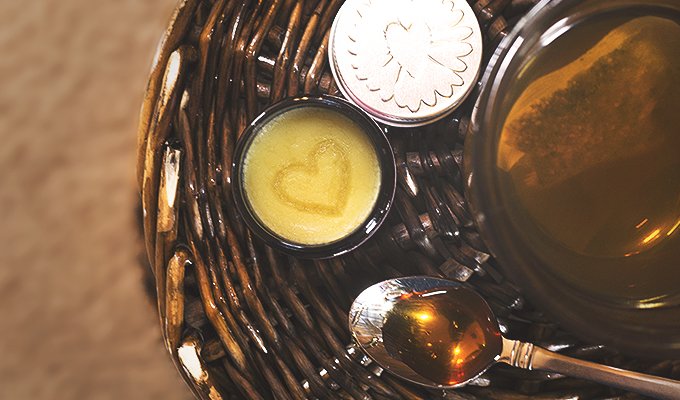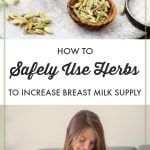Herbs for Breastfeeding and Increasing Your Milk Supply
You know the importance of proper nutrition, getting enough rest, and putting a good support system in place to help during your pregnancy and after you bring baby home. Another important part of that support system is planning for how you will care for and nourish your baby. One of the best things you can do for yourself and baby is to breastfeed.

But what happens if your body is a bit slow to produce enough milk for your little one?
It can be frustrating and even scary when we feel unable to adequately provide a vital need for our baby. Misinformation, or a lack of information, can make it insurmountable. Thankfully, help is available, and there are natural ways to assist your body in producing enough milk to keep your baby healthy and satisfied.
“Everyone wants the best for their baby… from breast milk’s disease fighting antibodies to its reputation for lowering risk of ear infection, asthma and childhood obesity, and nothing matches the bonding and precious together time that breastfeeding provides,” shares nurse and herbalist Melinda Olson.”With herbal help from Mother Nature, low breast milk is no reason to quit.”
Herbs for Breastfeeding
The German Commission E, a governmental regulatory agency established in 1978, evaluated the usefulness of more than 300 herbs by studying literature, clinical studies, case studies, and field studies and then presented their findings.
What they have found is that several herbs are useful as galactagogues (translated from the Greek ‘galacto’ for milk and ‘agogos’ meaning flow). These herbs that stimulate milk production. However, they also found that many galactagogues are also powerful uterine stimulates and may cause contractions, so it’s important not to use them during pregnancy.
Herbs that Can Aid in Breast Milk Production
First a special note: Herbs noted with two asterisks (**) act as uterine stimulants and should not be used during pregnancy.
Anise Seed* (Pimpinella Anisum) is a culinary spice and a digestive herb that helps get rid of gas and relieve indigestion and nausea as well as increase milk flow. Anise Seed can also be combined with Fennel seed and Caraway seed for stomach upsets and gastrointestinal issues. (*Anise seed is fine for use on its own during pregnancy; however, do not use it blended with Fennel or Caraway seeds while pregnant.)
Blessed Thistle** (Cnicus benedictus) is a bitter tasting herb often used in galactagogue, breastfeeding teas and tinctures. The bitters stimulate the secretion of saliva and gastric juices which helps with digestion. There is also much historical evidence that Blessed Thistle helps increase breast milk.
Chaste Tree (Vitex agnus castus) has historically been used to treat everything from hangovers to fevers to increasing breastmilk production. One of Chaste Tree‘s more popular uses is for reducing hot flashes and other symptoms of PMS and menopause.
Goat’s Rue (Galega officinalis) galactagogue properties were first noted to effectively increase milk in goats. It is used by nursing mothers and by farmers to increase milk production in their livestock. It grows so aggressively that it is now classified as a noxious weed. Goat’s Rue is not the same as Rue (Ruta graveolens), which is used in primitive cultures as a powerful uterine stimulant. This is a great example of why it’s important to look at the Latin name of the herbs for breastfeeding that you are using. That will help you distinguish between different varieties of the same herb that can have vastly different properties.
Fennel Seed** (Foeniculum vulgare) has been shown to increase milk production in goats and has long been used as a galactagogue by breastfeeding women. Fennel Seed tastes a bit like licorice and has been used to ease digestive problems. Because of its ability to soothe stomach upsets, it can help soothe a colicky breastfed baby and ease postpartum discomfort.
Fenugreek** (Trigonella foenum-graecum) is one of the herbs most often used to help increase breast milk supply. Fenugreek has a sweet and spicy flavor that makes it popular in many international cuisines, including Indian curry. It is used to help soothe digestion and is well documented to effectively decrease cholesterol and blood sugar as well as increasing breast milk supply. If you are allergic to chickpeas or suffer from asthma, avoid fenugreek.
Fenugreek is a good example of using all things in moderation. Small doses pose no issues for nursing mothers or their babies; however, large amounts of fenugreek can cause maple syrup like odor in the sweat, milk and urine.
Milk Thistle (Silybum marianum) is a liver protecting seed that has demonstrated liver protecting and detoxifying qualities. Milk Thistle has even been shown in recent studies to interfere with the promotion and progression of prostate, breast and endocervical tumor cells. A very recent study documented that women using milk thistle had significant increases in breast milk over the population using a placebo.
Nettle (Urtica dioica) is a delicious, nutritive vegetable loaded with easily digestible iron, calcium, vitamin K, and folic acid, and is a wonderful pregnancy tonic. Traditional wisdom supports the safe use of Nettle during lactation to increase breast milk as well as for providing nutritive support for the nursing mother.
If for some reason you can’t find good, organic supplies of your choice of these herbs for breastfeeding, a quality organic tea like Organic Milkmaid Tea is an excellent choice.
Aside from the medicinal benefits, what could be more soothing than sipping a hot cup of tea to help your amazing body do what it was designed to do anyway?
Herbs for Nipple Care
Now that you have your milk production under control, and you’re bonding with your baby, there is one more thing to prepare for when breastfeeding: Sore nipples.
Any nursing mother will tell you this happened to her at some point, and it can make a beautiful experience more than a bit uncomfortable, not to mention it can throw a wrench in what may or may not be an easy experience for a first time mom. Thankfully, there is safe, herbal help for sore or cracked nipples.
Herbs are not just amazing for tea! They can also be used externally to help soothe sore or chapped nipples. The “go to” herb for sore, cracked nipples is Calendula.
Calendula (Calendula officinalis) is for topical use only and has been used for centuries for its wound-healing and antiseptic properties. Calendula can also be used externally to slow bleeding, soothe skin conditions such as eczema and psoriasis, and ease the pain of minor burns, scrapes, and sunburn. Evidence-based research also supports the use of Calendula blossoms infused in oil as an ointment to effectively ease the pain of cracked or tender nipples for breastfeeding mothers.
Natural Nipple Butter, by Earth Mama Angel Baby, is an excellent topical treatment for sore, cracked nipples. If you have wool allergies or are concerned about the pesticide exposure associated with lanolin or beeswax, choose a lanolin-free nipple cream.
If you’re a mother having a difficulty with breastfeeding because of low milk production, or someone who cares enough to support one who is, we hope that these tips help and provide you with the support needed to build a strong supply and confidence in the process.
With a bit of patience, love, and help from Mother Nature, you and your baby will be able to reap the benefits of breastfeeding and perhaps even gain a bit of confidence in the most important parenting tool of all – your intuition.
So don’t worry…you’ve got this.


